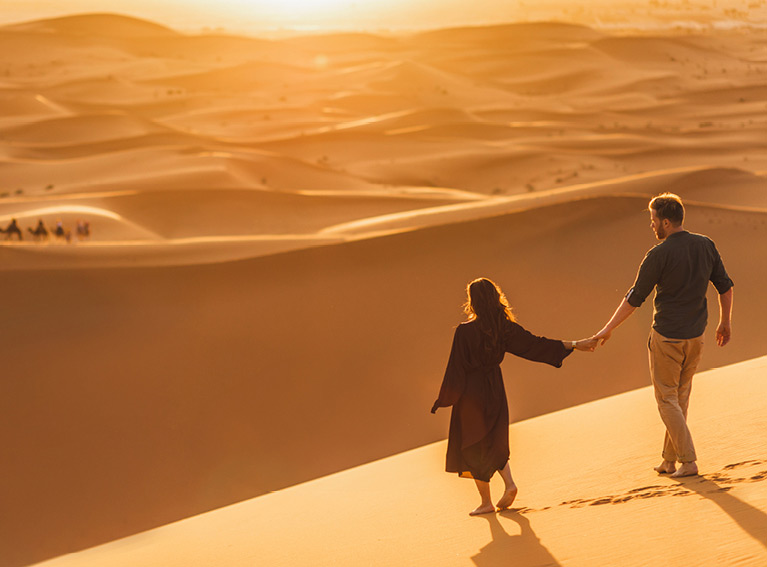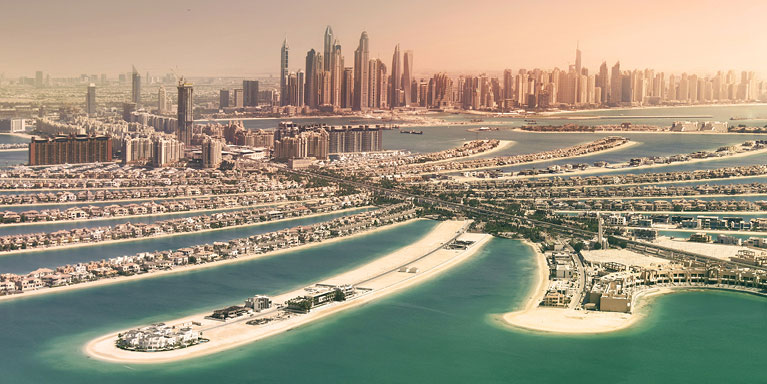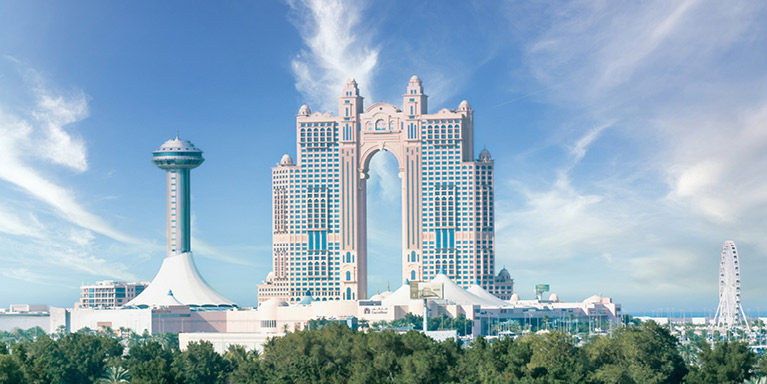
A guide to the United Arab Emirates
Our expert view on expat life in a progressive Gulf country

The United Arab Emirates offers plenty of opportunities for expats in search of a higher standard of living. Professionals from all over the world are attracted to the lively cities of Dubai and Abu Dhabi by the promise of large salaries, a chance to network, and the hope of accelerating their career progression.
With a large and diverse expat community, plus English being widely spoken, it’s easier than ever for new arrivals to settle in. It may take some time to adapt to the heat and a new culture, but you’ll soon find that the quality of life is worth it. In this guide, we’ll explore essential information to facilitate a seamless transition into your new life. And, if you’re thinking of moving abroad, we’ll be by your side as you embark on your latest adventure.
- Population: Around 10 million
- Currency: UAE dirham (AED)
- Capital: Abu Dhabi
- Biggest city: Dubai
- Main language: Arabic is the official language, but English is widely spoken
- Main religion: Islam
- Political system: The UAE is a federation of seven constitutional monarchies (emirates), with the ruler of Abu Dhabi traditionally the president
- International dialling code: +971
- Emergency services: 999
- Driving: On the right
-
Careers
The UAE is an attractive place for many businesses, with a strong banking sector and stable political system. The economy depends on qualified expats, who make up over 80% of the UAE population and help create a dynamic work environment.
English is widely spoken in business, but Arabic is the official language – so you may need some documents translating. Regulations vary from region to region, which can be confusing if you work in more than one part of the country. Most international companies tend to stick with the culture of its home country and a lot of business will be with other expats. Local organisations are often family owned and more traditionally Arabic.
Emiratis value trust above all in business, so it’s a good idea to get to know your colleagues and build relationships. They’re polite, prefer face-to-face meetings and are concerned about others’ feelings, so avoid criticism or bad news. Be prepared to answer questions about your family or wellbeing.
Business structures are hierarchical; decisions are made from the top and it’s important to know who sits where on the corporate ladder.
Business hours are between 7.30am and 9.00am to 5.00pm, Sunday to Thursday, and the summer schedule sometimes includes a three to four-hour break in the afternoon with extended evening hours. Office hours are shortened during Ramadan.
A handshake with your right hand is the usual greeting and placing your right hand on your chest after shaking hands shows respect. If you’re greeting a Muslim person of the opposite sex, wait for them to extend their hand first – a simple bow of the head is acceptable. Always give and receive any gifts with your right hand.
Expat salaries in the UAE are among the highest in the world, with favourable taxes, so it’s no wonder people are drawn to it for work. Although the cost of living is expensive, expat packages often include many of the basic costs or the salaries are high enough to offset it.
Education
Expat children can attend public schools in the UAE, but you’ll be charged fees (unlike locals). This, combined with the teaching being in Arabic, leads most parents to consider international schools.
The school year runs from September to July, with three terms, and the week runs from Sunday to Thursday with hours varying between schools.
Private schools are expensive, if not included in your employment package, which has led to an increase in homeschooling, particularly for expats who don’t intend to stay in the country long.
International schools tend to follow the British or American curricula or the International Baccalaureate, but there are also French, German, Japanese and Indian schools. By law, all children in public and private schools must take UAE Social Studies and Arabic as a second language up to Grade 9. Schools must also offer Islamic Education as a subject, but this is optional for non-Muslims.
-
Moving money
Putting the right banking arrangements in place is vital for expats around the world. You want to be able to access and transfer money easily, and with a bank you can trust to comply with international regulations. Most people have two banks – one in their home country and one local to where they’re living. But, if your bank has a global network, you may be able to set up an account ahead of your arrival, which gives you time to assess the financial market.
It’s important to understand how foreign exchange works and how fluctuating exchange rates can affect you. When you’re juggling finances in multiple currencies, remember that the currency markets can move quickly and make a big difference to the value of your money.
To help you reduce the risk of fluctuating currency, you could choose a foreign exchange that lets you fix an exchange rate for a fixed period. Then you’ll know exactly how much you need to convert, whatever happens in the market.
Budgeting
When you’re looking to move to a new country, you need to consider how a change in the cost of living could affect your finances. If you’re moving with your job, sometimes your employer may help with expenses, such as accommodation or school fees. Remember to account for setup costs, such as buying furniture and sorting insurance, when you’re thinking about your budget.
Groceries and other household goods are reasonably priced, but clothing and imported products are generally expensive. Eating at Indian, Arabic, Chinese and African restaurants are better value than hotel eateries and bars. Alcohol is expensive, although some hotel bars and restaurants have happy hours.
Costs
Some of our offshore accounts have a monthly fee, such as the International Current Account, whereas others, like the Premier International Account, don’t. Both offer fee free International Payments (correspondent and recipient bank charges may apply) and 24/7 worldwide access. Plus, the Premier also includes worldwide travel insurance for you and your family, which is underwritten by AWP P&C SA and administered by Allianz Assistance, which is a trading name of AWP Assistance UK Ltd. Eligibility criteria, terms and conditions apply.
Financial planning
While it’s going to be a busy time, it’s also worth setting some time aside to review your financial plans, such as whether you want to open any offshore accounts. They offer the convenience of keeping your money in one place so you can stay with the same bank no matter where life takes you.
Your expat status could give you new opportunities that weren’t available to you at home. However, tax rules differ from country to country, so if you’re unsure about your personal tax obligations, you should seek professional advice.
Lloyds Bank International Private Banking is by your side every step of the journey as you start your new life abroad. We offer international knowledge, experience and dedicated expert support to help meet all your financial needs. From savings to international payments and transfers, we can help you navigate the complex world of wealth management away from home.
Security
Offshore accounts are not protected by the Financial Services Compensation Scheme (FSCS), which protects savings up to £85,000 with authorised UK banks and building societies.
However, our accounts are covered by other schemes. The Jersey Bank Depositor Compensation Scheme, the Isle of Man Depositors’ Compensation Scheme and the Guernsey Banking Deposit Compensation Scheme offer protection for eligible deposits of up to £50,000.
Tax
No personal taxation currently exists in the UAE. Laws covering corporate tax exist in all the individual Emirates at a standard rate of 9% but, in practice, taxes are enforced only on the following entities:
- Foreign oil and gas producing companies at rates set forth in confidential government concession agreements.
- Branches of foreign banks at rates fixed by decree or in agreements with the Rulers of the Emirates.
There is no capital gains tax – they are taxed as regular business profits. The UAE does not impose net worth tax or estate and gift tax. There are no social security taxes on foreign nationals – UAE and other Gulf nationals contribute to retirement and pension funds. Value-added tax is at a rate of 5%, although certain items are exempt, and some items qualify for a rate 0%. VAT registration is mandatory for businesses with annual taxable supplies above the 375,000 AED threshold, and voluntary for businesses with annual taxable supplies above the 187,500 AED threshold.
Visitors to the UAE are entitled to VAT refunds for purchases of items being exported with the traveller on their departure if it’s not been used in the UAE.
A foreign national employed continuously for over a year is entitled to gratuity, which may not exceed the remuneration of two years. It’s calculated based on the last basic wage paid to the employee and payable on the termination or expiration of the employment contract.
The tax authority is the Ministry of Finance – see www.mof.gov.ae/en for further information.
Accommodation
Most expats gravitate towards the cities of Dubai and Abu Dhabi, where there is a highly developed infrastructure, good schools and medical facilities, and plenty to keep you entertained. The weather means you can enjoy an outdoor lifestyle with great beaches and water sports. If you need to stay out of the heat, you can find indoor skiing, excellent restaurants, and large shopping malls.
The price of rent in the UAE is likely to be your biggest expense. If you’re lucky, your employer may allocate housing or offer a housing allowance. You’ll have an abundance of choice, and the standard of housing is high, with lots of apartments having shared facilities, such as a gym, sauna and swimming pool. In the communities of compound villas, amenities often include a medical centre, tennis courts, gym and restaurant.
Furnished and unfurnished housing is available, but unfurnished apartments often lack the basic appliances, so it will cost you more to get set up. However, the transient nature of the UAE means you can usually pick up a bargain as there’s a thriving second-hand market with expats getting rid of stuff before moving on.
You need a residence visa, passport, proof of address and proof of income from your employer when you sign the lease to rent your accommodation. Leases are usually for a year, and you often must pay a full 12 months’ rent upfront, although some landlords accept post-dated cheques. You’ll also have to pay a security deposit of around 5% of the annual rent. Make sure to check for extra charges, such as maintenance fees, before signing up and that the landlord’s responsibilities are clearly stated.
Arts
Arabian culture dominates, particularly in architecture and folk arts. Dubai has attracted numerous galleries, such as the XVA Gallery or Third Line for contemporary art and the Miraj Islamic Art Centre for traditional works, and museums, from the heritage displayed at the Dubai Museum and Etihad through to the innovative and futuristic Museum of the Future. Abu Dhabi has ongoing cultural projects, including building a Guggenheim and Louvre.
In music, Liwa is performed locally by communities that contain descendants of Bantu people from the African Great Lakes. The Dubai Desert Rock Festival is a major heavy metal and rock festival.
Cinema in the United Arab Emirates is minimal but gradually expanding and there is a museum specially dedicated to it in Dubai.
Culture
The culture is generally conservative. Many women wear the traditional hijab or abaya and, although expats aren’t expected to follow this custom, it’s still important to dress modestly and cover your shoulders and legs in public.
The UAE government has recently relaxed and expanded personal freedoms for both expats and locals in the country. It’s now possible to buy alcohol without a licence and live as an unmarried couple.
Ramadan is the holiest time in the Islamic calendar, and you should avoid eating, drinking, and smoking during daylight hours in public or in front of Muslim friends and colleagues. Many companies reduce their hours and have special rooms for non-Muslim employees to eat during the holy month. When the fast is broken for the day, expats are encouraged to join in the feasting.
The relentless heat can be challenging, but all buildings are air-conditioned, and an indoor lifestyle sometimes becomes a necessity.
The week starts on a Sunday and the weekend is Friday and Saturday in the Emirates. Most government and public offices are closed on Saturdays.
Food
Rice, fish, and meat are the staple foods of the Emirates, with seafood having been the mainstay of the Emirati diet for centuries. The UAE cuisine has been influenced by other West and South Asian countries, such as Iran, Saudi Arabia, Pakistan, India and Oman. Lamb and mutton are preferred to goat and beef. Tea and coffee are the most popular beverages, complemented with cardamom or saffron to give them a distinctive flavour.
The influence of Western culture has brought fast food to the attention of young people, to the extent that campaigns have been held to highlight its dangers. Alcohol can be consumed, but it’s illegal to be intoxicated in public or drive a motor vehicle with any trace of alcohol in the blood.
Health
The private healthcare system in the UAE is excellent, but expensive. Make sure you have comprehensive medical insurance to avoid potentially huge medical bills. Expats must pass a health assessment and have medical insurance to get a residence visa and the law states that companies in Abu Dhabi and Dubai must provide medical insurance for expat employees, so you don’t need to worry about this expense.
If you do, however, need to take out your own private health insurance, in 2024 you could expect to pay around 5,500–10,000 AED (1,178–2,142 GBP or 1,497–2,722 USD) per year for individual policies, and 10,000–18,000 AED (2,142–3,854 GBP or 2,722–4,900 USD) per year for family plans.
Public services are also available, but not free for foreign residents, and most expats opt to go private as medical staff speak English and many doctors are either expats too or have trained overseas.
There are pharmacies in all the cities, with the majority open 24/7. Most medication is available, but there are strict drug laws, and you may find that you need a prescription for things that are sold over the counter back home.
Emergency services can be unpredictable as ambulances are predominantly used for road accidents, so most people use their own transport or taxis to get to a hospital in an emergency.
Pets
Your pet must be microchipped, vaccinated, and seen by a government-approved vet within the 24 hours before travel. Then your vet will complete a DEFRA (Department for Environment, Food and Rural Affairs) Export Health Certificate, which confirms that your pet meets the entry requirements. You’ll also need to have a pet passport and an import permit from the United Arab Emirates Ministry of Climate Change & Environment with your pet’s vaccination records.
Shipping
Shipping your own furniture from home is a good idea, as many rentals come unfurnished, but check that your appliances have the right voltage to work in the UAE. Many companies give expats a shipping allowance. If not, it might be worth negotiating it into your contract if possible.
There are strict rules about what you can and can’t take into the country – anything considered against the values, traditions and morality of the UAE is banned. Various medicines are banned, so check the UAE Ministry of Health’s list of controlled drugs before you move. Being caught with banned items can result in going to prison.
Transport
The public transport system is limited in the UAE, so a car is the most convenient way to get around. Petrol is cheap and you may be able to afford a better car than you could back home. The roads are good, and the cities are connected by multi-lane freeways, although these can get congested. Traffic regulations are strict and there’s a zero-tolerance policy towards drinking and driving. You can drive with an international licence, but you’ll need to get a local one if you have residency status.
Due to the hot climate, the UAE isn’t very pedestrian or cyclist friendly, but buses are frequent and taxis readily available in the major cities, including app services such as Uber. Dubai also has a metro system that is fast, efficient, and cheap.
The UAE is a major air travel hub and Dubai has one of the busiest airports in the world. Many international airlines offer daily services to and from the Emirates, making the country a great base for expats who want to explore.
Lloyds Bank International takes no responsibility for the accuracy of this information. It is provided for orientation purposes and to stimulate further research, not as advice. We advise that you independently verify any details and make decisions based on your own assessment. It is crucial you are aware of and comply with any relevant laws in your host country or country of origin.

Dubai
Dubai became a major trade centre due to the oil industry, but now its economy relies mainly on tourism and luxury brands. It possesses some fantastic art galleries and museums displaying everything from the traditional to the futuristic.

Abu Dhabi
As the capital of the United Arab Emirates, this multicultural city has experienced rapid growth and investment – as the spectacular cityscape can testify. Located on an island in the Persian Gulf, Abu Dhabi has around 250 miles of coastline with 6 miles of public beaches. It’s home to several cultural institutions and ongoing projects, including building a Guggenheim and Louvre.